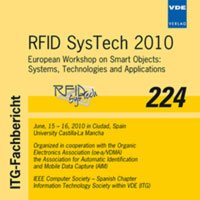Best Practices for Rigorous Evaluation of RFID Software Components
Konferenz: RFID Systech 2010 - European Workshop on Smart Objects: Systems, Technologies and Applications
15.06.2010 - 16.06.2010 in Ciudad, Spain
Tagungsband: RFID Systech 2010
Seiten: 10Sprache: EnglischTyp: PDF
Persönliche VDE-Mitglieder erhalten auf diesen Artikel 10% Rabatt
Autoren:
Müller, Jürgen; Schapranow, Matthieu; Pöpke, Conrad; Urbat, Michaela; Zeier, Alexander; Plattner, Hasso (Hasso Plattner Institute for IT Systems Engineering, Prof.-Dr.-Helmert-Str. 2-3, 14482 Potsdam, Germany)
Inhalt:
We agree that conducting rigorous evaluation of software artifacts is hard. This is especially true for RFID software components because of high throughput and large data volume. We see a lack in rigorous evaluation of RFID software components in research and industry. Guidelines are missing for how to generate test data, which metrics to apply, and how to setup a test environment. Without a common sense in how to evaluate RFID software components, the RFID community will not be able to compare software, which results in intransparency in the market. Furthermore, young researchers reinvent the wheel of how to evaluate their software artefacts again and again. For the research community, this means that the time of our brightest personnel is wasted because of missing standards and best practices. In this paper, we summarize our experience related to the evaluation of RFID software components that we gained in the last three years as software engineers. Thus, we present the use case of the European pharmaceutical supply chain, a supply chain simulator for generating RFID test data, relevant metrics to consider, and a distributed testing architecture. This should enable researchers and decision makers to fulfill the crucial task of software evaluation with relatively low effort. In summary, these best practices help the RFID community to become more mature.


